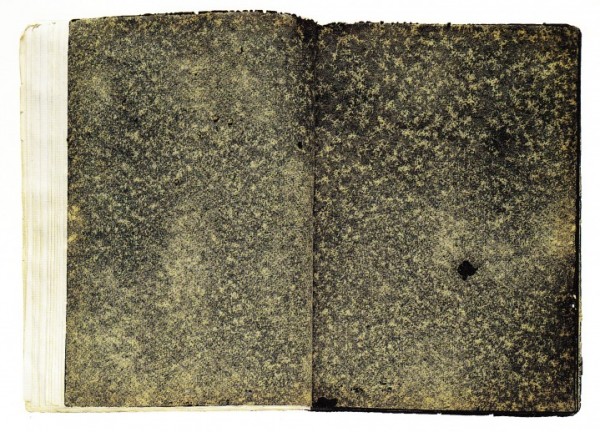“Since we happened to be in the street at the moment Paris was bombed, we had to take shelter in the metro. At that time these formalities were not taken seriously. And N. enjoyed anything that allowed her to leave her work. So the two of us were on the steps in the middle of an enormous crowd, the kind of crowd that is urgent and unwieldy, sometimes as motionless as the earth, sometimes rushing down like a torrent. For quite some time I had been talking to her in her mother tongue, which I found all the more moving since I knew very few words of it. As for her, she never actually spoke it, at least not with me, and yet if I began to falter, to string together awkward expressions, to form impossible idioms, she would listen to them with a kind of gaiety, and youth, and in turn would answer me in French, but in a different French from her own, more childish and talkative, as though her speech had become irresponsible, like mine, using an unknown language. And it is true that I too felt irresponsible in this other language, so unfamiliar to me; and this unreal stammering, of expressions that were more or less invented, and whose meaning flitted past, far away from my mind, drew from me things I never would have said, or thought, or even left unsaid in real words: it tempted me to let them be heard, and imparted to me, as I expressed them, a slight drunkenness which was no longer aware of its limits and boldly went farther than it should have. So I made the most friendly declarations to her in this language, which was a habit quite alien to me. I offered to marry her at least twice, which proved how fictitious my words were, since I had an aversion to marriage (and little respect for it), but in her language I married her, and I not only used that language lightly but, more or less inventing it, and with the ingenuity and truth of half-awareness, I expressed in it unknown feelings which shamelessly welled up in the form of that language and fooled even me, as they could have fooled her.”
–Maurice Blanchot, Death Sentence
Maurice Blanchot on inventing language in an unfamiliar tongue
5 required test of the status of the gouts of yellow snot of
11. I never understand what a translator must feel. To “guess” what word might represent the author’s intent. Like dancing about architecture or fucking about bowling parties, I’m sure. Here is a fascinating interview about translating Haruki Murakami.
55. At a thousand thousands, Sam Lipsyte reads Hob Broun.
5. There is no # 5. Ok, this: Taylor Swift is vacuous. So there is no # 5.
14444. Sean D. Kelly writes an essay about Scylla, blow-driers, Charybdis of religious delusion, the conditions of thigh chaffing and self-deception, the dancer as the dance, and the anxiety and nihilism of George Michael/Nietzschean post-God secularism. Well done, sir. And worth your time. Click. Trust me.
7. Hey you opinionated cacafuegos. What makes bad writing bad? This is sharp blow glow. Watch:
httpv://www.youtube.com/watch?v=raWLS2_PEfI
There’s no rule that says you get steadily better.
I had a big Hemingway boner.
It’s pretty bad.
middle-where?

What’s the difference between middle-class and bourgeois? Cultural consumption? Money? Conspicuous consumption? The size of tv screen or SUV?
I ask because I’ve been thinking about flaneurs a lot, especially the modern flaneur and what he would embody. Findings to come, as I find them. They are somewhere, probably between the covers of The Arcades Project.
“…[Y]ou’ll never become the writer you want to become. You’ll never be satisfied, never really know if you are any good. You’ll never be certain.”—from a 1998 letter by Dean Young to his nephew, the writer Seth Pollins. The entire thing is here, and it’s well worth reading. (Worth relinking to this open letter from Tony Hoagland about Dean’s current medical problems, I think.)
Peyton Manning on Writing

“People always say, ‘Hang in there.’ And I went, ‘I never was out there, wherever there is. I’ve always been in there, I’ll always be in there.’ Wherever that is, I never have left.”
Wind Call Swill Stein 2xQs Again

French rap is weird
1. Super thrilled to hear via twitter that Coffee House Press will be putting out a new collection by Brian Evenson, Windeye. Hopefully by 2011? No date word yet, but Evenson is the kind that I go stand in line for. If you haven’t read the titular story yet, it is gorgeous, and available via PEN America.
2. At Electric Literature, Melissa Broder interviews Ryan Call about, what else, litblogging.
3. James Yeh has a new chapbook out, 9/16/10, from a rad small press making beautiful objects, Swill Children.
4. The Complete Recordings of Gertrude Stein Reading Her Own Works @ PennSound
5. Interview with Dorothea Lasky by Nafiza Islam at Thoughts Interjected & interview with Patrick Somerville by Tobias Carroll at Vol 1. Brooklyn.
6. At Ubu, Doug Nufer’s Never Again, a 163 pg. novel with no word appearing more than once, which I discovered after an awesome conversation wondering if such a thing existed with Heather Christle and Christopher DeWeese, both of whom have books coming from Octopus in 2011 that I am also mega excited for.
Suggested Reading List for My Spring 2011 Fiction Workshop
(Because if you’re going to make a writer of yourself, you must read your brains out.) *
All Things, All at Once, Lee K. Abbott
The Box Man, Kobo Abe
Things Fall Apart, Chinua Achebe
The Children’s Hospital, Chris Adrian
A Death in the Family, James Agee
Man In His Time, Brian W. Aldiss READ MORE >
THE ARTIST ELUDES ANY SYSTEM
“When, in order to adapt to his destiny as an artist, Anselm Kiefer attempts to throw himself open to a dimension larger than himself, he does not retreat in the face of a force that may overwhelm and daunt him. He allows himself to be possessed and swept away by it, to become the arbiter of a challenge which ultimately implies the construction of the formal energy of art. To let ourselves be overwhelmed means to agree to be impregnated and to mediate that which submerges and overtakes us: to discover ourselves in order to discover. The artist, like the poet, eludes any system, whether good or bad, religious or moral: he negates himself, dies in favour of an unknown and indefinable force, and aspires to establish the right relationship with forms and their origins. He wants to succumb to their primacy and lets himself be shattered and overwhelmed not for any banal or general reason, whether it be ideological or sociological, anonymous or impersonal, but only for one exceptional reason: the survival of the language of art.”


